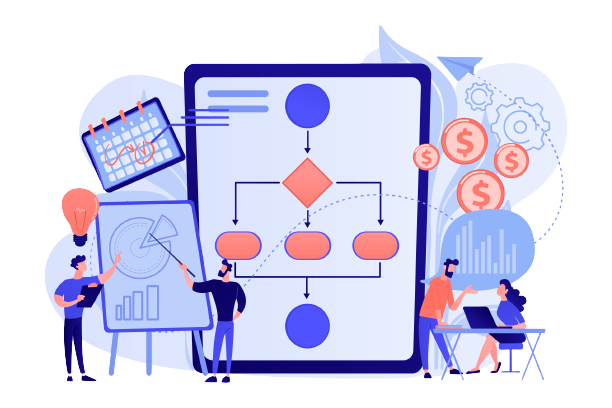
In the ever-evolving landscape of the business world, companies must get better at adjusting to changes, working efficiently, and putting customers first to achieve long-term success. Using CRM workflow automation as part of their strategy can bring lots of benefits and more opportunities.
Beyond improving customer retention and fostering loyalty, CRM workflow automation empowers businesses with actionable insights, streamlines their operations, and facilitates data-driven decision-making. As you embrace automation and technology, a robust CRM workflow automation system will position your business for sustained growth and prosperity in the long run.
The benefits of implementing CRM workflow automation reach far beyond short-term gains. For instance, it offers a pathway to sustained growth, profitability, and competitiveness in the dynamic business world. So, without any further delay, let’s look into the long-term benefits of a well-implemented CRM workflow automation strategy and the pitfalls that you should avoid to enjoy its benefits to the fullest.
Long-Term Benefits of a CRM Workflow Automation Strategy

The long-term benefits of CRM automated workflow strategy include:
1. Enhanced Customer Retention
Customer loyalty is an invaluable asset for businesses, and with a well-implemented CRM automated workflow strategy, you can significantly boost customer retention rates. As CRM workflow automation allows you to personalize follow-ups, tailor communications as per customer needs, and use predictive analysis, you can nurture relationships with your customers over time. Some of the ways by which CRM workflow automation enhances customer retention involve:
- Personalized Engagement: CRM automated workflow systems can allow you to tailor your interactions with customers based on customer preferences and behaviors. With this personalized engagement, you can create a strong bond with your customers by making them feel valued and understood. Over time these positive interactions will translate into long-term loyalty and help your business grow.
- Predictive Analytics: CRM systems have the capacity of collecting and analyzing data from different customer interactions, this will enable you to predict future customer needs and behaviors. With this predictive capability, you can proactively engage your customers and solve their problems, which will further solidify your relationships with them.
- Consistent Communication: With CRM workflow automation, you can also ensure that your customers receive consistent and timely communications through follow-up emails, updates, or product recommendations. This consistency will help you reinforce brand trust and keep your customers engaged over the long term.
With these features, a CRM workflow automation system will empower you to grow a loyal customer base that will continuously engage and transact with your brand to drive long-term revenue growth.
2. Improved Customer Insights
One of the most important practices that serves as a crucial element in the long-term success of a business is understanding your customers inside and out. With an appropriate CRM workflow automation system, you can easily do that, as it allows you to capture and analyze a wealth of customer data over time. As the abundant customer data accumulates, you can gain deeper insights into customer preferences, trends, and behaviors. So, let’s see how with a CRM workflow automation system you can know your customer better:
- Data Accumulation: Over time, CRM workflow automation systems collect abundant amounts of data which provides you with a comprehensive view of your customer interactions and preferences. With this historical data in hand, you can make strategic decisions like tailoring your products and services to keep your customers satisfied.
- Behavioral Analysis: CRM workflow automation can also allow you to track your customer behavior in real time and help you identify patterns and trends. With this knowledge of how your customers interact with your products or services, you can even tailor your offerings to their needs, which will not only increase customer satisfaction but foster long-term loyalty.
- Market Segmentation: CRM systems allow you to segment your customers based on different criteria like demographics, geography, level of engagement, and purchase history. This segmentation feature of CRM workflow automation empowers you to craft targeted marketing campaigns and ensure that your products and services resonate with the different customer segments over the long term.
With this knowledge in hand, you can make informed decisions, fine-tune your marketing strategies, and create tailored offerings, to remain relevant and competitive in the competitive world of business.
3. Streamlined Sales Processes

One of the most important teams for a business is its sales team, and with an appropriate CRM workflow automation system, you can enhance the efforts of this team efficiently. CRM workflow automation can automate routine tasks that your salespeople have to do daily while enhancing the process of lead scoring and follow-ups. As a result, your sales professionals will be able to focus on high-value activities like building relationships and closing deals. Here’s how CRM workflow automation can streamline your sales process:
- Efficiency in Lead Management: CRM workflow automation can streamline lead management and ensure that your leads are assigned, prioritized, and followed up on promptly. With this efficiency, your sales cycle will speed up, which will increase your revenue in return.
- Cross-Selling and Upselling: When you invest in a CRM automated workflow system, it allows you to track customer interactions and purchase history. As a result, you can identify opportunities for cross-selling and up-selling, and over time, this strategy can enhance average transaction values and increase customer lifetime value as well.
- Sales Performance Tracking: With a CRM workflow automation system, you can also track the performance of your sales team over time. With this data in hand, you can identify top performers, provide targeted training, and continuously improve your sales strategies for achieving long-term success.
This efficiency will eventually increase your sales productivity and propel your growth to new heights.
4. Data-Driven Decision-Making
In this digital age, you need extensive data in every step of your business to be successful. An appropriate CRM workflow automation system will help you with just that as it collects, processes, and presents data in an easy-to-understand format. You and your teams can act upon this data for decision-making. Let’s see how the abundant data collected by a CRM workflow automation can help your business:
- Historical Data Analysis: CRM systems store historical data on customer interaction, marketing campaigns, and sales performance, which can be analyzed by your teams to identify patterns and trends. You can also identify areas of improvement from this historical data to enhance your long-term strategic decisions.
- Performance Metrics: CRM automated workflow also generates real-time performance metrics and reports, which provide valuable insight into the effectiveness of various business operations. With this data, you can refine your operations, mitigate risks, recognize opportunities, and make informed decisions for achieving sustained success.
- Competitive Analysis: CRM systems also enable you to get insights into market trends and competitive positioning by tracking competitor data. This information can help you stay ahead of the competition as you can change your strategies based on market trends for long-term success.
5. Cost Reduction

Even if it is true that you need an initial investment to implement a CRM automated workflow system, its long-term cost savings should not be ignored. Let’s find out how CRM workflow automation can help in cost reduction:
- Reduced Manual Work: CRM workflow automation systems automate manual and time-consuming tasks, which eventually reduces the need for labor and labor costs alongside the potential for human errors.
- Minimized Marketing Expenses: CRM workflow automation systems also automate the process of creating targeted marketing campaigns, which not only increases conversion rate but reduces marketing costs per customer acquisition as well.
- Improved Resource Allocation: CRM systems can also empower you to allocate your resources more efficiently by providing a few data-driven insights. As a result, you can reduce the wastage of your resources and avoid unnecessary expenses, which over time will contribute to cost reduction.
6. Cross-Functional Collaboration
With a well-implemented CRM workflow automation strategy, you can also enjoy enhanced collaboration across your different departments. So, let’s see how CRM workflow automation systems improve cross-functional collaboration:
- Enhanced Communication: CRM workflow automation enables a smooth flow of information between departments, which will reduce the chances of miscommunications and prevent bottlenecks. With this enhanced communication you will be able to enhance your overall business performance and achieve your long-term growth objectives at the same time.
- 360-Degree Customer View: CRM workflow automation empowers its users with a 360-degree view of each customer, which eventually allows different departments to understand customer needs and preferences. This holistic view will enable your cross-functional teams to work cohesively and deliver consistent customer experience over time.
Common Pitfalls to Avoid
Implementing a CRM workflow automation strategy can bring numerous benefits, but to be able to enjoy its long-term advantages you should avoid common pitfalls. So, let’s look into some common pitfalls and understand how you can steer clear of them:
1. Lack of Clear Objectives

If you implement CRM workflow automation without a clear set of objectives and a well-defined strategy, it can lead to confusion and inefficiency. So, to avoid this pitfall, you should start by setting clear objectives and measurable goals for your CRM workflow automation project. You can do this by identifying the specific processes you want to improve, and the outcomes you expect to achieve. But, do not forget to consider your business objectives while creating the strategy.
2. Failing to Provide Adequate Training
Another common pitfall that you should be aware of is not providing adequate training to users. If you fail to provide appropriate training to the individuals in your teams who will be using the CRM system, it will result in underutilization of the system and cause frustration among employees. To avoid this pitfall, you should invest in a comprehensive user training program and provide continuous training and support for achieving long-term success.
3. Using a One-Size-Fits-All Approach
If you use a one-size-fits-all approach without customizing the CRM system to your specific business needs it can limit your chances of succeeding. To avoid this situation, you can focus on customizing fields, workflows, and reports to match your unique needs, which may change over time.
4. Failure to Adapt to Changing Needs
If you neglect to adapt your CRM workflow automation system to the evolving business needs and industry trends, you can face the issue of obsolescence. This would be particularly harmful to your growth and competitive edge. To avoid this, you should regularly review and update your CRM automated workflow strategy so that it stays aligned with changes in your business environment. You should also focus on staying informed about emerging technology and trends.
5. Ignoring User Feedback

Failing together act upon user feedback can affect your capacity to meet your business goals and resistance to using the system. To avoid this pitfall, you can focus on encouraging users to provide feedback and suggestions for improvement. You should also act on the valuable feedback provided by the users by making necessary adjustments and enhancements to the system.
6. Lack of Scalability
Last but not least, if you implement a CRM workflow automation system that cannot scale, it will become insignificant in the long run. Scalability is one of the most important factors to consider while choosing a CRM workflow automation system, as it ensures that the system will be able to accommodate your future growth. To avoid this pitfall, choose a CRM that offers scalability.
Wrapping Up!
The benefits of a CRM workflow automation strategy reach far beyond short-term benefits, it paves the way for sustained growth, competitiveness, and profitability in the business world. By embracing CRM automated workflow systems, you can achieve long-term advantages such as enhanced customer retention, improved customer insights, streamlined sales processes, data-driven decision-making, cost reduction, and cross-functional collaboration.
However, to be able to enjoy these benefits, you should avoid the pitfalls of not setting clear objectives, not providing adequate training, using a one-size-fits-all approach, not adapting to changing needs, ignoring user feedback, and choosing a CRM system that does not offer scalability.
If you successfully avoid these pitfalls, a well-implemented CRM automated workflow can prove to be a valuable long-term investment for your business, which will position you for sustained growth, profitability, and success in this ever-evolving business world. Besides, by investing in CRM automated workflow you can not only improve your operations, but secure your future.